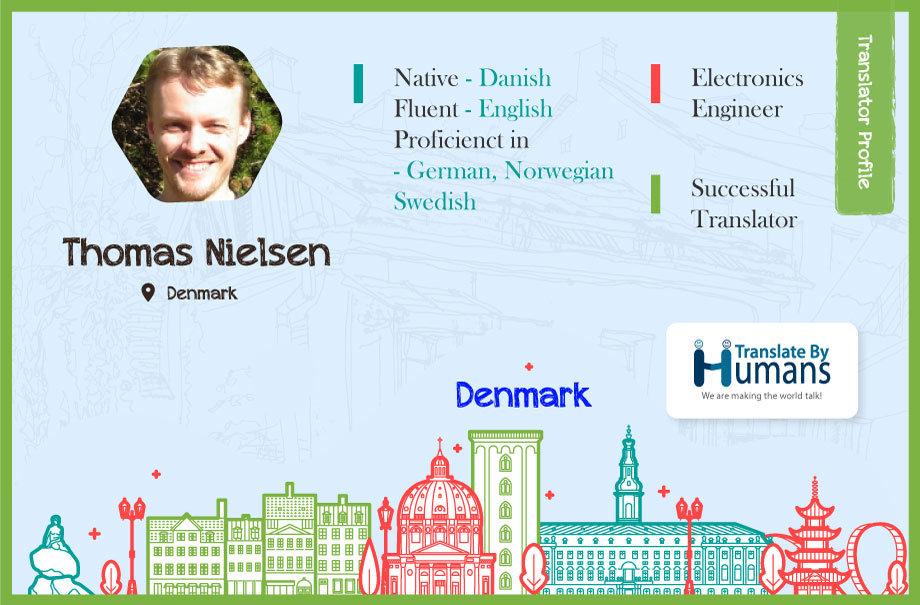Every month, we interview one of our translators and share their insights with you. Last month we published the first part of our interview with the highly experienced electronics engineer turned English to Danish translator – Thomas Nielsen! In this part, Thomas, who lives in Denmark, talks to us about best practices for business and entrepreneurship. In case you missed the first part of the interview, read it here!

1: What’s the best advice you ever received?

Thomas:
The best advice I have received is that it’s my job to stay in front of my customers so that I know what they need when they need it. This was not my job as an electronics engineer, but as a translator and as a business owner, it is fundamental that you take care of this.
2: What has been your biggest challenge, and how did you overcome it?
Thomas:
The biggest challenge for me in my business was to appreciate all the different parts that form a business. It has been a matter of learning to appreciate all the parts and roles in a complete business and realizing that you don’t even have to have a product yourself if you’re really good at marketing and selling other people’s products.
TBH
That’s very true. How did you learn these business essentials?
Thomas:
I learned to appreciate and understand all the parts of a business by studying different successful businesses, by translators or by people in other industries. It doesn’t really matter what industry they are in because the underlying business principles are the same.
3: Who are your biggest influences and why?

Thomas:
I have come across many great minds on my journey, but I want to highlight a few: Steve Pavlina for being so awesome when it comes to pretty much everything related to personal development. Dan Lok teaches marketing, sales, and entrepreneurship, and he is very generous with his advice. Jenae Spry is absolutely rocking the world of translation and is raising the bar all the time for what is possible for translators and their businesses.
4: What has been the most interesting project you’ve ever worked on?
Thomas:
I like to translate websites because there is a little bit of everything, and it gives me a sense of solving a problem instead of just working on an isolated piece of text. I know that the translation of a complete website will bring my clients new customers, and there is also some localisation involved, which gives me that feeling of being an expert in my culture and country.
5: How do you want to be remembered?

Thomas:
Thomas: I think that when most people remember a translation, it is usually not good. When they remember a positive experience, it is most likely because the message was very clear, and they didn’t notice that it was a translation.
6: What surprising lessons have you learned along the way as a translator?

Thomas:
One of the most surprising things I have learned as a translator is how completely unregulated the translation market is. I have found all types of people with all types of expectations in this industry, and even people who don’t want to call it an industry but call it art instead. Machines are also marching in, in the form of artificial intelligence and creating a new contrast to the old part of the market. Are machines now supposed to make art?
TBH
That’s a very valid point. What are your thoughts on the speed and quality of translations?
Thomas:
If you take the three parameters, speed, quality and price, you will find incredible spans for these.
Sometimes it is much more valuable to send a thousand pages through artificial intelligence in an hour so that you can get a general idea of the content. However, if Mercedes needs to have its marketing materials translated for the next worldwide launch, they really don’t want to find any silly translation mistakes in their expensive campaigns.
7: What advice would you give to an aspiring translator?

Thomas:
When you’re starting out I would recommend that you get into the habit of contacting at least one new potential client every day. If you don’t have any jobs for translation you can go for 10 per day.
I am not talking about keeping the conversation going with 1 to 10 potential clients per day, but also reaching out to a completely new potential client, who has never heard about you before. Approaching hundreds of new potential clients per year is not uncommon in the beginning, because you have to work your way through a lot of rejections and cases where you don’t even receive a reply.
TBH
That’s great advice. Thank you so much for being here with us today! We’re glad to be a part of your exciting career path!
Thomas:
Oh, it’s a pleasure. I enjoy working with TBH and am glad to have shared some of my experiences with you.

